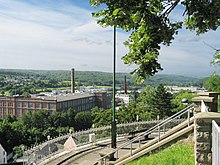Eupen cable works
| Kabelwerk Eupen AG | |
|---|---|
| legal form | Corporation |
| founding | 1747 |
| Seat | Eupen , Belgium |
| Number of employees | circa 865 |
| sales | EUR 314 million (2018) |
| Branch | Metal and plastic processing |
| Website | www.eupen.com |
The cable plant Eupen AG is a Belgian producer of electricity - telephone - television, high security and fiber optic cables , foams and foam products and plastic tubes based in Eupen . The company was founded in 1909 through a re-establishment and goes back to a hemp rope factory established in 1747 .
history
The story of today's cable factory begins with the hemp rope factory "JP Bourseaux & Sons" founded by Johann Bourseaux in 1747 in the city that was then part of the Austrian Netherlands . In the first years of the 20th century, when Eupen was still part of the German Empire , his descendants, the brothers Carl and August Bourseaux, recognized their opportunities in the emerging electrical lighting and began producing electrical cables (the insulated wires were used in the In the early years it was still sourced from an external supplier) in a former furniture and paper tube factory in the city center. A few years later, demand had grown to such an extent that the company had to move to larger buildings a few years later. In 1909, near Kammgarnwerke AG , which was founded around the same time, they took over the factory building of the former Feder wool spinning mill on the banks of the Weser . The company "Kabelwerk Eupen" was founded. Further acquisitions such as a wire drawing machine and a rubber mixing plant followed, and bicycle tires and rubber soles could now also be made, the latter being produced until the early 1970s.
After the Eupen district was annexed to Belgium as a result of the Versailles Treaty in 1920, the company was continued under Belgian company law and was only again under German legal supervision during the German occupation of Belgium in World War II between 1940 and 1944. Due to the connection to Belgium, the subsidiary Kabelwerk Rhenania GmbH was founded in Aachen in 1921 , where a production facility for fiber optic cables was set up in 1995 .
While the neighboring worsted yarn factories and other textile companies were unable to recover from the effects of the global economic crisis , the war years and the emergence of synthetic fabrics and gradually reduced or stopped their production, the cable factories gradually took over the vacant buildings from 1956, including the former white spinning mill of the worsted yarn factories in the district of Hütte, an old mill complex and a tannery in the Oe and later the buildings of the Oebahnhof, as well as gradually extensive meadows.
the post war period
The first production facility for plastic foam was set up in the white spinning mill , which had to move to a meadow in the Weser Valley around 1969 due to the risk of fire. A necessary new building was erected in 1971 on the site along Oestrasse and at that time, with a production hall of 18,000 m³, it was one of the most modern and largest of its kind in Europe.
In 1956, the production of plastic pipe extrusions began in the main plant , which moved to the vacated former foam plant in the old white spinning mill in the early 1970s.
In the 1960s, especially after the early introduction of cable television in Belgium, the cable factory expanded its product range to include coaxial cables , which are currently used for cell phone antennas. Safety cables for nuclear power plants were produced from the 1970s . The flame retardant properties of this product have been further developed and it is still used today in the sensitive area of new nuclear power plants. At the beginning of the 1980s and with the final closure of the worsted yarn factories, the cable factory had taken over all of their factory buildings, but also had numerous of their own production buildings built or modernized. One focus was now the production of protective tube systems for fiber optic cables . The next few decades were characterized by further research and developments to improve manufacturing processes. The cable factory has a strong market position through the manufacture and further development of slotted cables (also known as radiant cables), which are used in mines, underground garages or tunnels, for example, in order to maintain cell phone reception there.
The turnover of Kabelwerk AG consists of 80% cable production and 10% production of synthetic foam and plastic pipes. Around 80% of sales are achieved in Germany and around 15% in neighboring countries. Due to the strongly fluctuating market prices of the most important raw material, copper, sales are also subject to strong fluctuations.
The cable factory became the most important employer in the region and employed around 1100 people in 2015, 850 of them at the Eupen location, making it the region's largest industrial employer. Up to the present day, members of the founding family were and still are active in important functions in the company, such as the son of one of the founders, Ritter Alfred Bourseaux or Frédéric Charles Bourseaux.
literature
- Ministry of the German-speaking Community (ed.): The industrial history of the Eupen Lower Town , Eupen July 2015 ( pdf )
Web links
Individual evidence
- ↑ Homepage Kabelwerk Rhenania GmbH Aachen
- ↑ Report on the cable works on BRF.be (2015)
- ↑ entry Alfred Bourseaux (* 1928) at bloomberg.com
- ↑ People today: FC Bourseaux , on Ostbelgien directly from January 26, 2013
Coordinates: 50 ° 37 ′ 16.6 ″ N , 6 ° 1 ′ 55.2 ″ E


